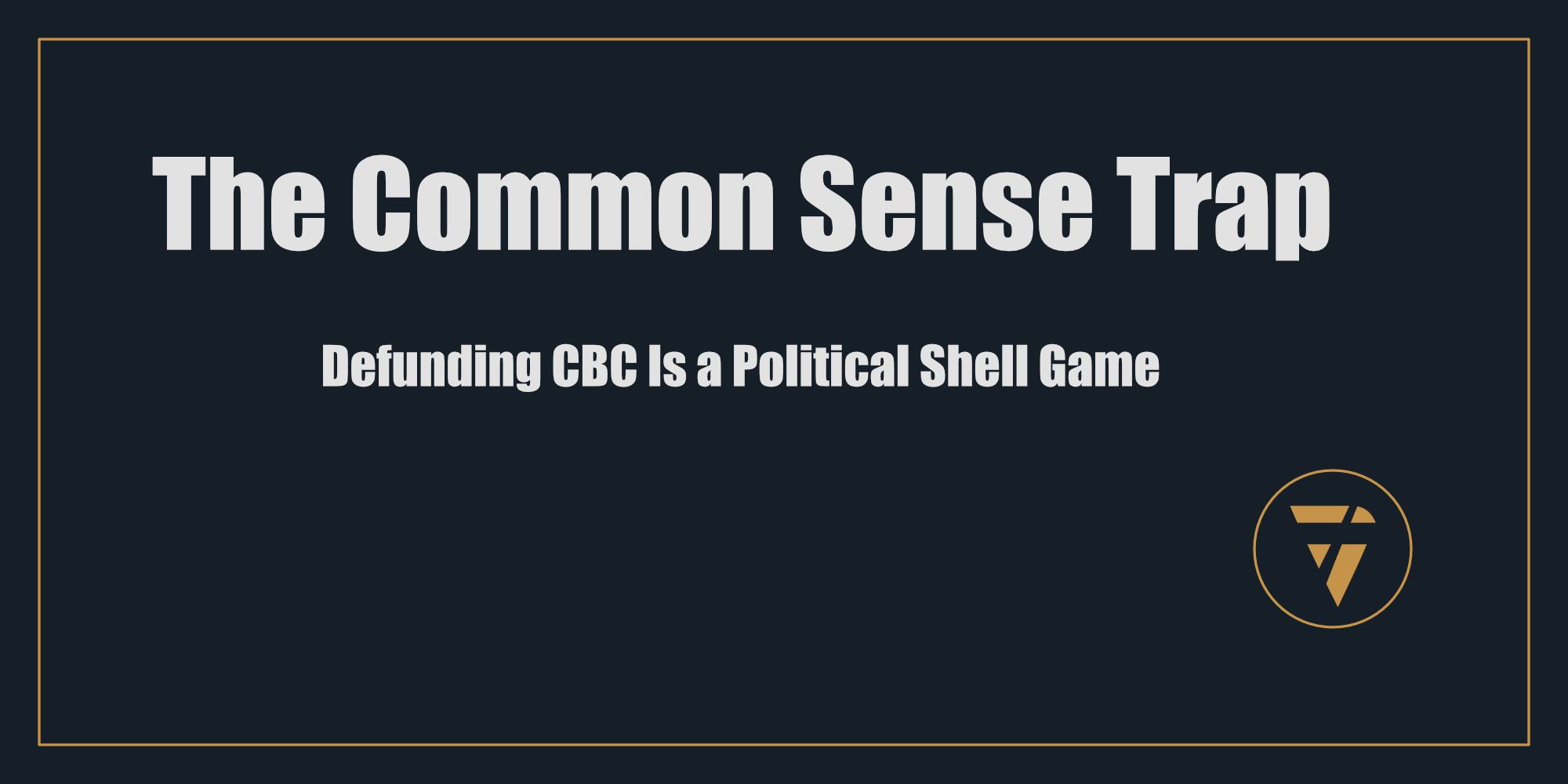The Common Sense Trap

Defunding CBC Is a Political Shell Game
1. The "Common Sense" Rhetoric and the Bait-and-Switch
Conservatives love to package policy in neat little slogans—"Defund the CBC" sounds simple, clean, and straightforward. Poilievre and his team frame it as a "common sense" move, positioning themselves as champions of the taxpayer.
But here’s the trick: when they say they will preserve funding for francophone Canadians through Radio-Canada, they are knowingly misleading the public. CBC and Radio-Canada are one institution with integrated infrastructure—you cannot dismantle one half and leave the other untouched.
This isn’t about common sense. It’s about political theatre—a strategy designed to dismantle public broadcasting under the guise of "fairness" while maintaining just enough plausible deniability to avoid a backlash from francophone communities.
2. The National Conversation That Isn’t
Conservatives claim they’ve been having a "national conversation" about defunding the CBC for years. But what they actually mean is repeating a slogan over and over again until people mistake it for a serious policy debate. "Axe the tax". A national conversation requires facts, engagement, and a willingness to grapple with complexity—not just a series of soundbites fed to an angry base.
The reality? CBC’s funding is already minimal compared to other public broadcasters worldwide. The station operates on a budget that is a fraction of what BBC or France Télévisions receive. Cutting it further won’t just "save money"; it will gut independent journalism, reduce media diversity, and leave more room for corporate-controlled news monopolies.
3. Who Actually Benefits?
Let’s be blunt: gutting CBC benefits two groups—corporate media owners and political actors who don’t like being held accountable. In the U.S., we saw what happened when public broadcasting was weakened: fewer watchdogs, more media consolidation, and the rise of hyper-partisan infotainment. If you think Canadian media is bad now, wait until there’s even less competition and less independent oversight.
Poilievre’s "common sense" solution doesn’t serve Canadians—it serves those who want to control the flow of information.
4. The Bigger Picture: Starving the Fourth Estate
Public broadcasters exist not to compete with private media, but to ensure that journalism in the public interest remains viable. In an era of growing misinformation, cutting funding to the CBC weakens one of the last bastions of fact-based, publicly accountable reporting.
Many of the same conservatives who decry media bias conveniently ignore the fact that corporate media outlets have built-in financial incentives to frame news in ways that serve their advertisers and ownership. CBC, flawed as it is, at least has a mandate to serve the public good. We can exemplify the highest standard in the world. But we have to choose it.
5. How to Push Back Against the "Common Sense" Spin
- Demand Specifics: When conservatives say "defund the CBC," ask how they plan to do it without destroying essential news services.
- Expose the Contradictions: If Radio-Canada needs public funding, why doesn’t CBC?
- Follow the Money: Who benefits when public broadcasting disappears? (Hint: it’s not you.)
- Support Real Journalism: The answer isn’t defunding public media—it’s making it better, stronger, and more accountable.
This Is Not About Savings—It’s About Control
The push to defund the CBC isn’t about fiscal responsibility. It’s about weakening independent media and centralizing control of public discourse. If conservatives succeed in selling their "common sense" rhetoric, Canadians will wake up one day with fewer places to turn for journalism that isn’t dictated by corporate interests.
"Who benefits?" is always the question. And when it comes to defunding the CBC, the answer is never the public.
This is what I’m working on. Tell me what you think, I enjoy the conversation! Subscribe and follow the work in real time.
Thanks!
B

"Common sense" isn’t policy, it's non-sense. It’s a slogan designed to shut down debate. This isn’t about savings; it’s about control. Who benefits? Not you.
PS -

What does common sense mean to you?
Join the conversation.






